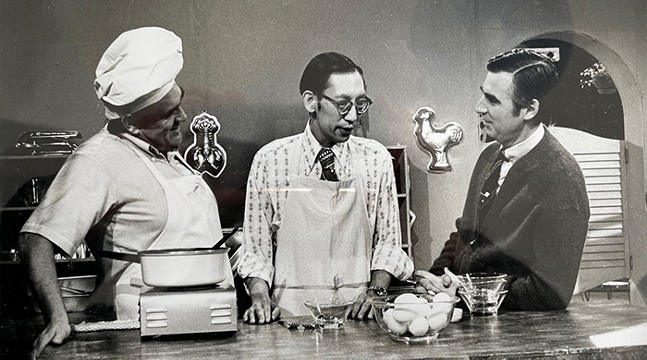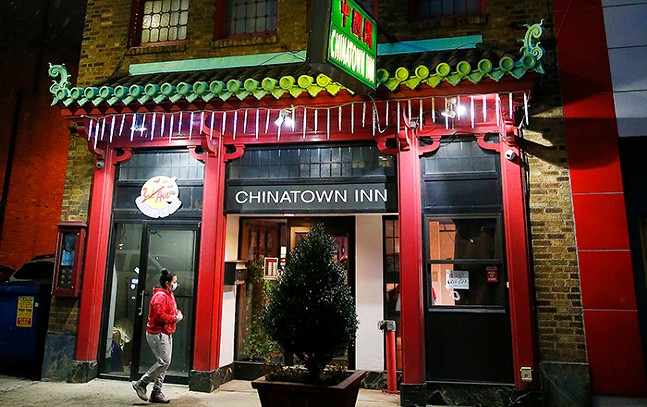
Photo: Courtesy of Shirley Yee
A photograph of Shirley Yee’s father, Yuen Yee (center), on Mister Rogers’ Neighborhood
The Historic Pittsburgh Chinatown Celebration, scheduled for Sat., April 16 on Third Avenue between Grant and Ross streets, will be a free outdoor event featuring live music, cultural performances, crafts, and food.
In its heyday in the early 1900s, Pittsburgh’s Chinatown, a Downtown neighborhood on Second and Third avenues between Ross and Grant streets, was a vibrant area full of Chinese-owned businesses and restaurants.
Although the city destroyed much of the neighborhood in 1921 to build the Boulevard of the Allies, after which most of Chinatown’s residents slowly relocated elsewhere, it remains an area of historical significance.
Shirley Yee, daughter of Yuen Yee, the last informal mayor of Pittsburgh’s Chinatown, plans to contribute to the historic landmark celebration by offering a walking tour of the neighborhood featuring places of significance to her family, which was invested in the well-being of the city’s Chinese community.
Shirley says her grandfather, Toy Yee, came to Pittsburgh in 1919 and lived on Second Avenue in Chinatown before returning briefly to China, where he married her grandmother and conceived her father, and then moved back to Pittsburgh.
In 1930, despite the fact that the 1882 Chinese Exclusion Act had banned “both skilled and unskilled laborers and Chinese employed in mining” from entering the U.S., Shirley says Toy was able to successfully send for his wife and six-year-old son. Because he worked for his cousin, Tong Yee, in the Quong Ye Tang mercantile store, Toy could classify himself as a merchant, Shirley says, allowing him to skirt the ban on Chinese “laborers.”
Shirley describes the Quong Ye Tang store as “the nerve center of the whole Chinatown.”
“It was like a general store,” Yee tells Pittsburgh City Paper, “with a kitchen, and on Sundays, [it was] the community meeting place to drink tea, play mahjong, and chat with friends. Through the Depression years, my grandfather cooked free meals for the lodgers (former laundrymen) who lived upstairs and for any Chinese person who needed a meal. In the early 1950s, the elder laundrymen lodgers moved next door (522 Third Ave.) to the On Leong Tong Association (Peace and Fraternity) building. In 1967, it became a permanent retirement home for the former laundry workers. Then, my father, Yuen Yee, like his father before him, served his community by becoming their caretaker, providing for their needs, until the end of their lives.”
When Yuen and his mother moved to Pittsburgh’s Chinatown in 1930, Shirley says “half of the businesses [had] closed and many of the people moved away. … My family was the last family to settle in Chinatown. But there were a couple of other families, mostly lodgers and laborers who lived upstairs of the few remaining shops. And in about the 1930s and ’40s, that was reduced to about 10 or 12 businesses and shops and the two fraternal organizations.”
After the Yee family moved away from Chinatown in 1951, first to East Liberty and then Mount Lebanon, Shirley says they continued to visit every Sunday. Yuen wrote that he “never really left Chinatown.”
Shirley says her father “became the spokesman and representative of Chinatown and the unofficial mayor because he grew up here. He went to grade school and high school and college here in Pittsburgh.”
According to his 2008 obituary, Yuen provided crucial support for Chinese immigrants who came to Pittsburgh in the 1940s and 1950s. “He accompanied them to hospitals and the public assistance office, did their taxes, tutored them for citizenship tests, and negotiated their leases,” according to the Pittsburgh Post-Gazette. “He interpreted for the Immigration and Naturalization Service and mediated arguments between landlords and tenants, cooks and dishwashers. He even helped former restaurant employees open competing restaurants.”
Yuen’s obituary quotes from his handwritten memoir of an “irrepressible life” and “the dramas, large and small” of Pittsburgh’s Chinatown.
Shirley, a graphic designer by trade, says she had always planned to publish her father’s stories as a graphic novel, but recently decided to combine his life stories with her own to tell a bigger story about Chinese life in Pittsburgh. “The plan is to have it published in about a year or so,” she says.
Many of the stops on Shirley’s walking tour are inspired by her father’s stories — largely taken from his handwritten notes penned with his left hand because his right side was paralyzed from a stroke — about his childhood in Chinatown. One stop will be a now-boarded-up secret from her father’s manuscript.
“There's a secret passageway that I just looked at the other day, it's blocked off. I heard that from my childhood, and my father mentions it in stories, the secret passageway that connected from Second Avenue to Third Avenue,” Shirley recalls. “It was just right along the side of the On Leong Association building. And so my father would play on Third Avenue, and his father would warn him not to go down that secret passageway.”
Speaking of what Pittsburgh’s Chinatown means to her, Shirley says, “A lot of my heritage, my roots, my identity, [are] all from there. And even though I didn't grow up there, my ancestors arrived there and lived and worked there. But it was through their hard work and perseverance, that helped us, the next generation, go to college and blend into the society at large. We were all able to accomplish our dreams thanks to their hard work.”
Pittsburgh Chinatown Celebration. 1-4 p.m. Sat., April 16. Third Avenue, between Grant and Ross streets. Free. Search “Pittsburgh Chinatown Celebration” on Facebook


